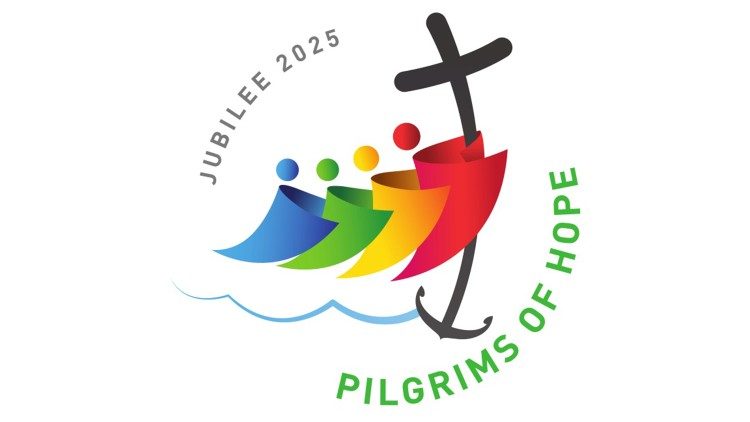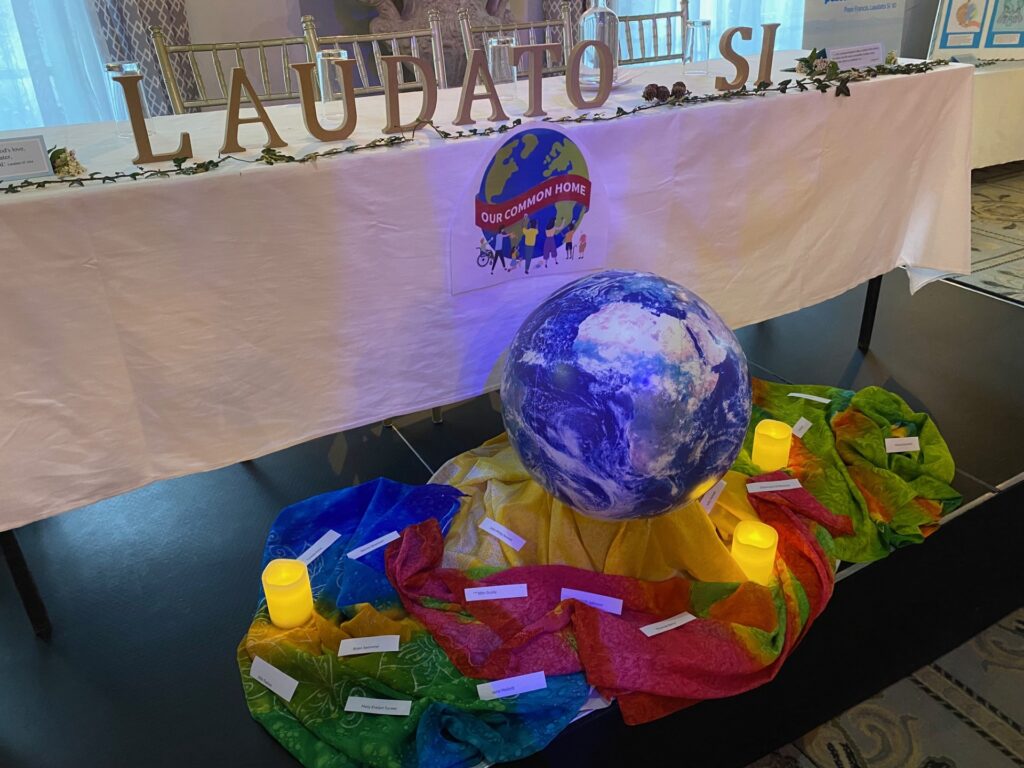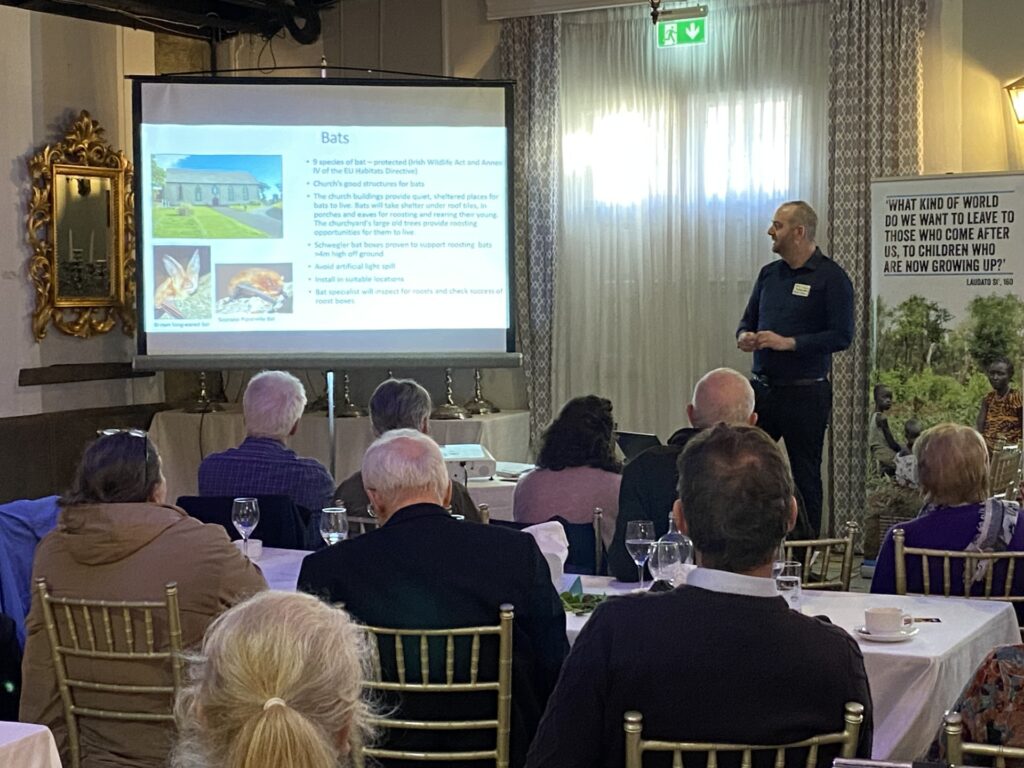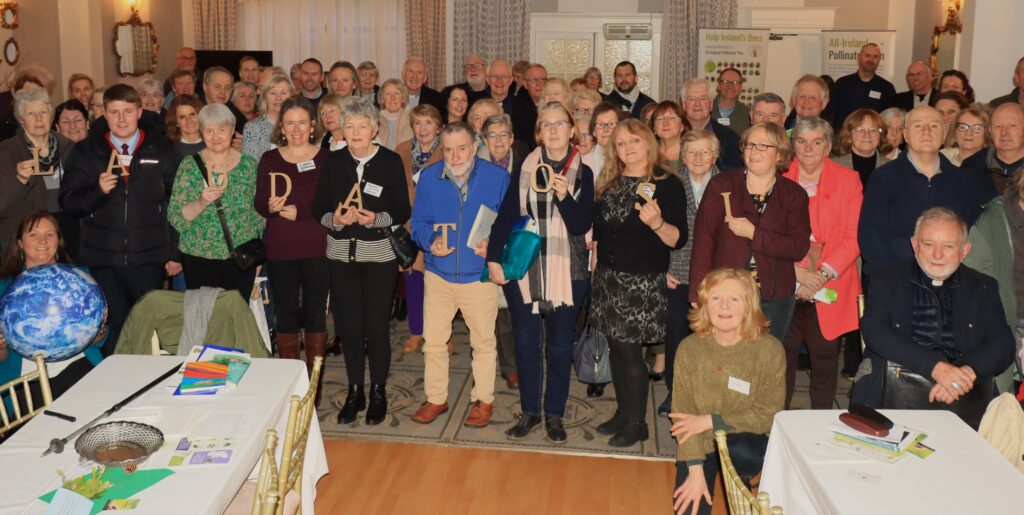
2025 marks ten years since the publication of the papal encyclical Laudato Si’: On Care for our Common Home and it is also a jubilee year with the theme ‘Pilgrims of Hope’. On the same day that a ten-hour international vigil was held online to mark the anniversary of Laudato Si’, approximately 170 people gathered in person in Cork with a similar purpose. They were attending the Seeds of Hope conference, a celebration of Laudato Si’ and an exploration of how to return biodiversity to parishes. The event was organised by Trócaire and the Laudato Si’ movement in partnership with the Dioceses of Cashel and Emly, Kerry, Killaloe, and Limerick, and took place in the Springfort Hall Hotel outside Mallow on Saturday 25 January.

Despite challenging weather conditions the previous day due to Storm Éowyn, the organisers were able to proceed with the event and the large conference hall was packed with attendees and exhibitors and buzzed with conversation throughout the day.
The day began with prayers led by the Killorglin Parish Care for Creation Group, which were followed by a presentation by Bishop Martin Hayes, Bishop of Kilmore and Bishop with responsibility for Laudato Si’. Bishop Hayes discussed the interconnectedness of all life and reminded us of Pope Francis’s teaching that an ecological conversion involves developing ‘a loving awareness that we are not disconnected from the rest of creatures, but joined in a splendid universal communion’ (Laudato Si’ 220). He pointed to the many Season of Creation resources that have been developed for faith communities to use to help them with their community conversion, such as this river ritual.
The next speaker was Kate Chandler, Communities and Engagement Pollinator Officer with the National Biodiversity Data Centre, who presented very useful and practical information on how to conserve and help biodiversity in parish grounds. Biodiversity in parishes has received increased attention since the Irish Bishops’ Conference agreed in 2023 that 30% of church grounds should be returned to nature by 2030. Kate reminded attendees that it is important to start by surveying the grounds, to establish a baseline and to ensure that you protect what is already there. She pointed to the All-Ireland Pollinator Plan guidelines for faith communities as a key resource about helpful actions for pollinators.
Sr. Nellie McLaughlin RSM had been due to present about ‘Caring for Creation: an Issue or a Way of Life?’ but unfortunately was unable to travel from Donegal due to the storm. Instead, the audience heard from County Clare Biodiversity Officer Barry O’Loughlin, who talked about a pilot project run last year with twelve parishes who identified ways of creating space for nature in parish grounds. Barry is part of the Heritage Council Local Authority Biodiversity Officer Programme which facilitates communities and local authorities to work together to protect and enhance biodiversity.

After each presentation, the audience was invited to reflect and discuss, and there was a plenary feedback session with all three speakers before lunch.
During break times, attendees had the chance to meet representatives from various organisations who can support faith communities in their creation care work, such as An Tairseach ecology centre in Wicklow town, Cabragh Wetlands visitor and interpretive centre near Thurles, St Patrick’s Missionary Society in Kiltegan, Co Wicklow, Pocket Forests, and Eco Congregation Ireland.
After the lunch break, a selection of six 40-minute workshops were offered. Each ran twice, giving everyone the chance to attend two. The topics and speakers were:
- Return to Nature with Barry O’Loughlin (County Clare Biodiversity Officer)
- Eco-Spirituality with Betty Baker, Salesian Sister
- Eco-Spirituality ~ Our Celtic Heritage, with Sr. Trinita Laffan, Presentation Sister
- Eco-Parish Award with Eco Congregation Ireland (ECI), Rev. Andrew Orr & Sr. Anna Byrne
- Mapping your Grounds for Nature with Niamh Ní Dhúill
- Parish as Oasis with Siobhán McNamara, Jesuit Centre for Faith and Justice.
As the JCFJ’s recently-appointed Environmental Policy Intern, I facilitated the workshops presenting some of the creation care ideas explored in the book The Parish as Oasis. Five of the ‘experiments’ included in the book were introduced, projects that communities can do because they are good and joyful things in and of themselves, not because they feel that they should out of guilt or fear. Whether it’s letting wildflowers grow, taking part in citizen science projects, opening up parish grounds to the wider community, planting a pocket forest, or experimenting with growing food, these initiatives are opportunities to build community, involve new people, and develop our awareness and appreciation of the other species with which we are interconnected. Instead of thinking about climate action in terms of sacrifice, when we see it as a chance to improve lives (our own and our neighbours’) it can give new motivation to what we might see as small or insignificant actions.
It was a day full of energy and ideas, a chance for individuals and parish groups to be reassured that they are not alone in their concern and care for our common home. In Laudate Deum, Pope Francis reminds us that ‘there are no cultural changes without personal changes’ (Laudate Deum 70), which Bishop Hayes referred to in his opening address to the conference. At the same time, ‘most effective solutions will not come from individual efforts alone, but above all from major political decisions on the national and international level’ (LD69). When we think about recent extreme weather events in various parts of our planet, read the latest reports on the state of the climate, or consider recent political developments at home and elsewhere, it is very easy to feel disillusioned and powerless. That is why it is so important to have chances like this to meet and share experiences, to energise each other with solace and hope, to know that we are not the only ones who care and who are willing to act. We thank the organisers of this very special event for giving us this chance.
And we should remember that individual and community efforts can be effective. As Pope Francis observes:
‘The mere fact that personal, family and community habits are changing is contributing to greater concern about the unfulfilled responsibilities of the political sectors and indignation at the lack of interest shown by the powerful. Let us realize, then, that even though this does not immediately produce a notable effect from the quantitative standpoint, we are helping to bring about large processes of transformation rising from deep within society.’ (Laudate Deum 71)

Thanks to Róisín Alexander-Pye of Trócaire for the photographs.

